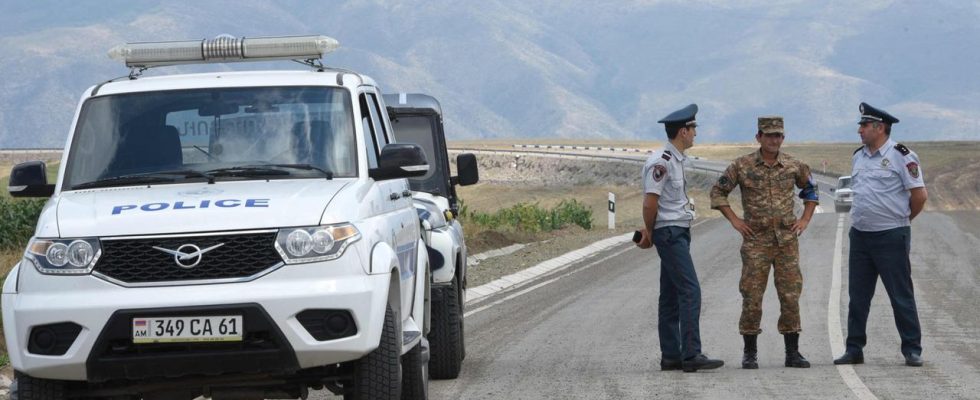Azerbaijan has been blocking access to Nagorno-Karabakh for almost nine months. The Armenians there now lack almost everything. Now there is apparently an agreement on resuming aid deliveries.
The first relief supplies could arrive in Nagorno-Karabakh on Sunday. For almost nine months, Azerbaijan has been blockading the region on its territory inhabited by Armenians. In recent weeks, the Azerbaijani leadership has allowed fewer and fewer transports, so that even bread has had to be rationed in recent days.
Armenian security expert Richard Giragosian said that an agreement has now been reached with the key mediation of the International Red Cross tagesschau.de with. He confirmed Armenian and Azerbaijani media reports that aid was expected to enter the region from two sides. The Russian Red Cross will therefore bring aid supplies to Nagorno-Karabakh from the Azerbaijani side. Footage of a convoy in the Azerbaijani capital Baku could already be seen on social media.
In return, the Lachin corridor – the only road connection between Nagorno-Karabakh and Armenia – is to be reopened. The International Red Cross and the troops stationed there should be allowed to resume their transports.
Azerbaijan had insisted on supplying the Armenians in Nagorno-Karabakh from its side. However, the Armenians feared that they would lose their independence and become solely dependent on Azerbaijan. They also blocked an aid transport from the Azerbaijani Red Crescent with 40 tons of urgently needed flour because they feared that this could lead to an invasion by Azerbaijani troops.
New leadership in Nagorno-Karabakh
The situation in the conflict region had deteriorated considerably in the past few days. Footage from Nagorno-Karabakh showed queues in front of bakeries and empty streets. Due to a lack of gasoline, cars hardly drive anymore. The electricity and gas supply also keeps failing. In view of the hopeless situation, the previous President Araik Harutjunjan resigned in recent days. On Saturday, four out of five parties in parliament voted for interim president Samwel Sharamanjan. Even though the Azerbaijani government does not recognize the election, this agreement was reached immediately after the change of leadership.
The leadership in Baku has also come under massive pressure in the past few days. After the EU mission on site and Armenia’s Prime Minister Nikol Pashinyan drew attention to a massive Azerbaijani troop buildup around Nagorno-Karabakh and in the border area of both states, several states increased their diplomatic efforts. Chancellor Olaf Scholz, French President Emmanuel Macron and representatives of other governments spoke to Pashinyan by telephone. US Secretary of State Antony Blinken and others spoke with Azerbaijani President Ilham Aliyev.
The southern neighbor Iran also renewed its threats that it would not stand idly by if Azerbaijan moved borders and blocked the connection between Iran and Armenia.
Turning away from Russia
Iran and India are allies of Armenia. In recent months there have been several reports that India is supplying arms to Armenia. Until now, Russia has been Armenia’s most important arms supplier and protecting power. But during the war in 2020, the Russian leadership allowed Azerbaijan to do so for a long time without military intervention. Only when there was a threat of expulsion of all Armenians from Nagorno-Karabakh in November 2020 did Russia enforce a ceasefire and station peacekeepers in Nagorno-Karabakh.
To the massive disappointment of the Armenians, Russia and the CSTO military alliance it led repeatedly refused support, even when Azerbaijan began attacking Armenia itself in the spring of 2021.
In the past few days, the Armenian government decided to make a series of foreign policy signals against Russia: It did not send representatives to a CSTO military exercise. Instead, the Armenian armed forces are holding training for deployment as peacekeepers with the US Army. Armenia also sent humanitarian aid to Ukraine for the first time since the Russian invasion on February 24, 2022. And the Armenian parliament is expected to soon ratify a document recognizing the International Criminal Court in The Hague. Armenia would then be obliged to execute the international arrest warrant against Russian President Vladimir Putin should he travel to Armenia.
All of this was accompanied by harsh criticism from Yerevan of Russia’s inaction. The government in Moscow responded with accusations against Armenia, but also with Putin’s spokesman Dmitry Peskov saying that Russia would remain present in the South Caucasus and ensure stability. The fact that the Russian sub-organization of the Red Cross is now involved in the agreement could indicate efforts in Moscow to become more active in the South Caucasus again alongside the USA and the EU.
If the agreement to open the roads to Nagorno-Karabakh is adhered to by both sides, this could give new impetus to the peace negotiations ongoing at several levels. If this does not succeed, there is a further threat of military escalation and the expulsion of the Armenians from Nagorno-Karabakh.

